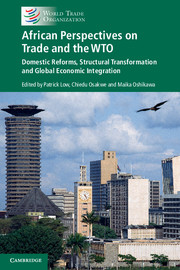 African Perspectives on Trade and the WTO
African Perspectives on Trade and the WTO Book contents
- African Perspectives on Trade and the WTO
- African Perspectives on Trade and the WTO
- Copyright page
- Contents
- Figures
- Plates
- Contributors
- Message
- Joint Foreword
- Book part
- Glossary
- Disclaimer
- 1 Introduction and Overview
- Part I The Future of the Multilateral Trading System: Perspectives from African Policy-Makers and Partners
- Part II Africa’s Participation in the Rules-Based Multilateral Trading System
- Part III Selected Development Experiences and Perspectives
- Book part
- Index
- Plate Section (PDF Only)
- Book part
- References
Part III - Selected Development Experiences and Perspectives
Published online by Cambridge University Press: 27 October 2016
- African Perspectives on Trade and the WTO
- African Perspectives on Trade and the WTO
- Copyright page
- Contents
- Figures
- Plates
- Contributors
- Message
- Joint Foreword
- Book part
- Glossary
- Disclaimer
- 1 Introduction and Overview
- Part I The Future of the Multilateral Trading System: Perspectives from African Policy-Makers and Partners
- Part II Africa’s Participation in the Rules-Based Multilateral Trading System
- Part III Selected Development Experiences and Perspectives
- Book part
- Index
- Plate Section (PDF Only)
- Book part
- References
Summary
Industrialization is one of the cardinal priorities for economies in dynamic transformation from a commodity base to a diversified value-added development stage. In major African economies, as in other economies worldwide, industrial policy is resurgent and back at the centre of economic policy. The sectors in focus revolve around manufacturing, textiles and clothing, footwear, automobiles, infrastructure, information technology products, petrochemicals, aluminium smelting, agro- and cut flower industries. African economies actively applying industrial policy include Algeria, Egypt, Ethiopia, Kenya, Madagascar, Mozambique, Nigeria, Rwanda and South Africa.
Although in the developed industrial economies, the re-attachment to trade activism and industrial policy are due in large measure to the rationale of spillover and network effects, in Africa the emphatic return of industrial policies is in part a response to the acute re-emergence of old challenges, such as the end of the current spin of the commodity super-cycle, a de-industrialization angst, and accumulating economic problems in a fragile and uncertain global economy. The current spur to industrialization is a reaction to the challenges emerging from the externally transmitted shocks from the 2008 Great Recession, the slowdown in Emerging Markets (EM), excessive turbulence and volatility in global markets, balance-of-payment pressures, domestic pressures for faster growth rates to respond to demographic transition of youthful populations, rising unemployment and associated social problems. The argument for resurgent industrial policy is predicated on the imperatives for domestic reforms to improve competitiveness, reverse de-industrialization, diversify and modernize domestic economies to accelerate growth, avoid laggard status and seek convergence through integration to regional and global value chains.
The problem is three-fold. First, at its origin, industrial policy was controversial, dividing even like-minded economists because of the assumption that rapid growth and development occur behind protectionist walls. Second, African policy-makers are concerned with industrial reversal and that industrial policy is foreclosed by WTO trade rules. Third, the navigational challenges between rules-based constraints vis-à-vis sound policy fundamentals are compounded by a political economy factor that must be managed to secure policy buy-in and stability for governance. Three questions are addressed: Do WTO trade rules impede industrial policies?; What scope exists for the modern application of industrial policies and in what policy combinations to maximize their utility?; and Are there parameters for industrial policy and ‘activist trade policy’ for WTO consistency?
The WTO legal and policy framework and associated jurisprudence neither foreclose nor impede industrial development policies ex ante. Scope exists in multilateral trade rules for the use of industrial development policy for faster poverty-reducing growth, job creation, promotion of public goods, efficiency in resource allocation, sustainable development and intervention to reverse market failures and achieve positive externalities. There is scope for smart industrial policy in a rules-based market economy to the extent that industrial policy applications must learn from past experience and correctly interpret market and technology trends. Rational application should integrate state-of-the-art technology and apply sound market economy fundamentals. These are critical in designing twenty-first-century industrial policies, so as to avoid a repeat of the costly failures of the 1950s, 1960s import substitution and ‘statist-type’ policies that foundered on the grounds of discrimination, protectionism and the absence of performance criteria. Industrial policy and application must be modern, integrationist, in forward motion and lock-step with the infrastructure of the latest stage(s) of the industrial revolution and the digital economy.
- Type
- Chapter
- Information
- African Perspectives on Trade and the WTODomestic Reforms, Structural Transformation and Global Economic Integration, pp. 315 - 440Publisher: Cambridge University PressPrint publication year: 2016
